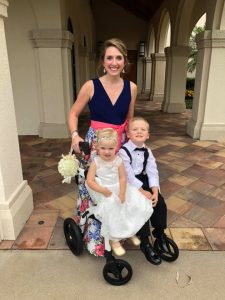Informing Children About Friedreich’s Ataxia
Written by |

They say there is no parenting handbook. There is no universal system or code that can set you up for foolproof success in raising your children to be confident and competent adults.
As the mom of a nearly 6-year-old son and a 3-year-old daughter, I can certainly confirm that. Add in a progressively degenerative disease, and there really isn’t an “easy” step-by-step guide to your role as a parent.
When I was diagnosed with Friedreich’s ataxia (FA) in 2013, our plan to have children was a major concern. I didn’t know if I still could, if I should, or what mothering with FA would look like.
As we gathered more information about my diagnosis, I met with Dr. David Lynch at the Children’s Hospital of Philadelphia. I asked him if it was wise or advisable to have babies now that I had FA, desperate for a clear answer to make the choice for me.
His answer was simple: “If you wanted to have children before FA, there’s no reason you should let FA stop you now.”
A classic overthinker, I talked through our dilemma with everyone. I quickly learned that no prospective parent knows what life will look like once your baby arrives. No one really knows what they’re doing, yet it’s estimated that 385,000 new babies are born every day worldwide.
So, my husband and I decided to go for it, determined to figure it out as we went. We welcomed our son, Brooks, in 2014.
Fortunately, FA did not negatively affect my pregnancy or delivery, and my pregnancy and delivery did not negatively affect my FA. Still, pregnancy is but a blip in the lifelong journey of parenthood. Once our son was here, I had to figure out how to parent him successfully in the face of my disability.
My FA symptoms didn’t begin to affect every aspect of my life until about 2018. Therefore, I was a pretty “normal” mom for most of my son’s infancy and toddlerhood. When he was a baby, I could walk and hold his hand, carry him, and pop out of bed to tend to him in the middle of the night. As he grew, I couldn’t run with him, but I could have tickle fights and play hide-and-seek, catch, and all of the silly games toddlers fill their days with.
The same can’t be said for my daughter, Collins, who was born in mid-2017. She has really only known life with a “disabled mom.”
Now, my kids are both very comfortable with my walker. They have accepted it as just another part of me. They know that “Mommy’s legs don’t work very well,” but they don’t yet know the words “Friedreich’s ataxia.” They know I get really tired some days and are great about entertaining each other or snuggling up for movie days on the couch, but they don’t understand what “chronic fatigue” means.
Those hard conversations will come, but they know enough about my disability at this age. My children will view my walker differently when they begin to comprehend the realities of FA as they learn more with age. But everything will work out just as it has so far.
Kids are a lot more resilient and flexible than we give them credit for. While I assume they wouldn’t have chosen to have a “disabled mom,” their perspective will uniquely shape their hearts and minds.
Maybe watching their mom progress through a rare disease will spur them to pursue a life in the medical field, and they will become the brilliant mind that eventually finds a cure for FA! Maybe seeing the emotional effects of my physical disabilities will shape their hearts so they can help other patients and loved ones walk this journey.
This resilience and perspective will help with the inevitable tough conversations that are in the future for my family. I will do my best to guide them through the process of accepting FA as I continue down that path daily.
For now, I am thankful my children are healthy and FA-free. I am thankful I am just “Mom” to them. I am thankful for my village that helps me navigate the waters of parenting with FA, even without an official guidebook.
***
Friedreich’s Ataxia News is strictly a news and information website about the disease. It does not provide medical advice, diagnosis or treatment. This content is not intended to be a substitute for professional medical advice, diagnosis, or treatment. Always seek the advice of your physician or another qualified health provider with any questions you may have regarding a medical condition. Never disregard professional medical advice or delay in seeking it because of something you have read on this website.The opinions expressed in this column are not those of Friedreich’s Ataxia News or its parent company, Bionews, and are intended to spark discussion about issues pertaining to Friedreich’s ataxia.







Leave a comment
Fill in the required fields to post. Your email address will not be published.